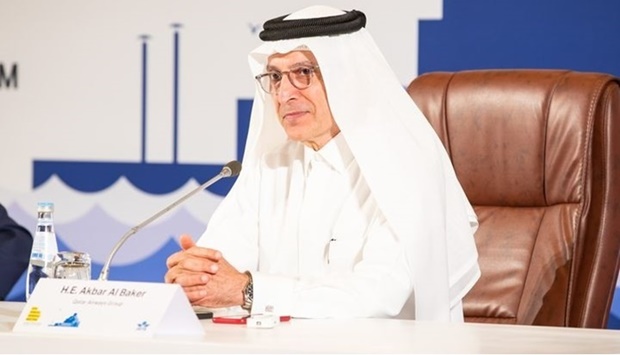A research project on producing sustainable aviation fuel (SAF) at Qatar University, sponsored by Qatar Airways, has made “really good progress”, airline Group Chief Executive HE Akbar al-Baker has said.
“The research project with Qatar Airways participation has been going on for the last 10 years. The results are very positive,” al-Baker told reporters on the sidelines of IATA’s 78th Annual General Meeting in Doha Tuesday.
Al-Baker said, “Once they master the process, I think they will be able to produce large amounts of SAF.”
He said, “As for me, I will be delighted to fuel my aircraft as much as possible, provided the SAF costs are affordable. Worldwide, there is a huge demand for alternate fuel – sustainable fuels.”
In an earlier industry event in Doha, al-Baker had said “refining companies should provide adequate sustainable aviation fuel so that the airline industry could buy SAF and meet the emission targets even faster.”
“Right now adequate quantities of SAF are not available. At Qatar Airways, we have contacted many refining companies, but they are unable to provide us the quantities of alternate fuel that we want.
According to IATA, in 2021, irrespective of price (SAF is between two and four times the price of conventional jet fuel), airlines have purchased every drop of the 125mn litres of SAF that was available. And already more than 38 countries have SAF-specific policies that clear the way for the market to develop.
Taking their cue from these policy measures, airlines have entered into $17bn of forward-purchasing agreements for SAF.
In October 2021, IATA member airlines came together and took the monumental decision to commit to achieving net zero emissions by 2050. This commitment brings the industry in line with the Paris Agreement’s 1.5°C goal. Climate change is the greatest threat facing the societies and achieving net zero emissions will be a huge challenge as the expected scale of the industry in 2050 will require the mitigation of 1.8 gigatons of carbon.
To provide the right set of consistent policies and long-term stability needed for investments, the aviation industry is calling on all governments to support the adoption of a long term climate goal for air transport at the 41st Assembly of the International Civil Aviation Organisation (ICAO) this September, aligned with industry commitments.
This climate goal is critical to back up the industry’s decarbonisation ambitions and would provide a global multilateral framework for action without distorting competition.
Business / Business
Qatar Airways-sponsored SAF research project at QU makes good progress: Al-Baker

Qatar Airways Group Chief Executive HE Akbar al-Baker.
